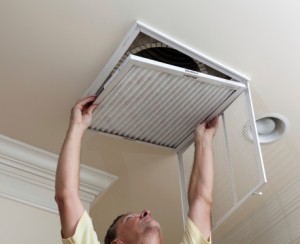Furnace and Air Conditioner Filter FAQ
Get answers to your top questions about HVAC filtration.
 You probably already know that any forced air HVAC system comes with a filter designed to help remove dust and allergens from your indoor air. But do you really understand the filters in your system and how proper filter maintenance can affect your overall HVAC efficiency? Check out these filter FAQs to find out.
You probably already know that any forced air HVAC system comes with a filter designed to help remove dust and allergens from your indoor air. But do you really understand the filters in your system and how proper filter maintenance can affect your overall HVAC efficiency? Check out these filter FAQs to find out.
How Often Should I Replace My Filters?
As a guideline, most manufacturers recommend replacing your furnace and air conditioner filters every 6 months. However, what you really need to do is check the filters every 6 months. If you see that dust and debris is not accumulating very quickly, you may be able to go more than 6 months on a filter. But if you see that the filter is getting very dirty very fast (perhaps because you have a lot of pets or dust in the home) you may need to replace it more often than every 6 months. The main goal is to avoid running the system on a dirty filter, as a filter that is full of debris presents more resistance to airflow and therefore reduces your HVAC efficiency.
What Do MERV Ratings Mean?
MERV stands for Minimum Efficiency Rating Value. The higher the rating, the greater the filtration. For most homeowners, a filter with a MERV rating of 13 to 16 that can capture up to 75 percent of all airborne particles 0.3 microns or greater on each pass is perfectly adequate.
Do I Need HEPA Filtration?
The average homeowner does not need HEPA filtration. This High-Efficiency Particulate Air filtration is designed for applications where contaminants absolutely must be trapped on the first pass through the filter, such as hospitals or worksites with hazards like asbestos. Installing a HEPA filter at home would result in reduced efficiency for your HVAC system.
How Do Replace My HVAC Filters?
The easiest way to replace your HVAC filters is simply to call a professional for furnace or air conditioner service. If you have a planned maintenance agreement, filtration will automatically be handled on your annual service visits. If you wish to replace your own filters, you will need to access the air-handler cabinet, measure the old filter, and then go buy a new one to install. You may also need to check for filters in individual air handler grilles.
What if My Air Quality is Still Poor?
If you still suffer from dusty air after installing clean new filters, you may have a bigger problem. One possible cause is holes in your air ducts that are allowing dust from the attic or crawl space to enter your HVAC system and then your home. The best way to resolve indoor air quality issues like this is to contact General Heating & Air Conditioning for professional troubleshooting and HVAC repair.
